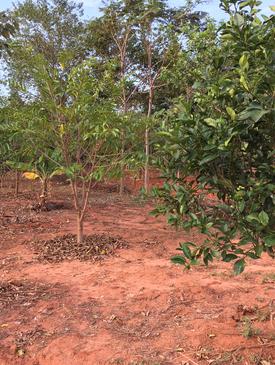Training of Trainers in Rural Settlements: Sustainable Productive Landscapes
Summary
The Brazilian Atlantic Forest is one of the world’s most important yet most threatened ecoregions. The remnants of the Atlantic Forest contain “genetic banks” of the world’s rarest species and support the livelihoods of 70% of the Brazilian human population who live there. These fragments protect watersheds, prevent erosion and regulate microclimates, all ecosystems services that are vital to the existence of Brazil’s most populated cities and rural areas. After centuries of unsustainable use, this important ecosystem has lost 90% of its original cover and turned into small forest islands surrounded by rapid agricultural and urban growth.
In the Pontal do Paranapanema, the Atlantic Forest has seen a recent deforestation and dramatic increase in human population. Large-scale conventional ranching and sugarcane encroached on the forest remnants in this region during 1960-1990. In the mid-1990s, with pressure from the Landless Rural Worker’s Movement, farmlands were expropriated and redistributed to more than 5,000 landless families who now live in rural settlements. With an increase in human population, there is a continuous need to promote sustainable productive systems that protect the remaining biodiversity, sustain ecosystem services and support social welfare within this landscape.
IPÊ and ELTI created a field course for members of these rural settlements to adopt sustainable productive systems. This course will teach principles of agroecology and ecological restoration through agroforestry, silvopastoral systems and forest restoration. Over five days, participants will study ecological and sustainable agriculture principles and practice concepts with visits to demonstration sites and practical activities. The course will also cover practical tools for participants to become leaders within their communities. At the end of the course, participants will have a project plan to adopt and disseminate sustainable productive practices.
Content
The course content is divided into six thematic modules:
Module 1: Introduction to sustainable production systems, ecological restoration and social engagement
- Site contextualization: local environmental problems, ecosystem services and sustainable production
- Tools for participatory engagement and leadership empowerment
Module 2: Introduction to agroforestry systems
- Principles and applications
- Establishing and managing an agroforestry system
Module 3: Introduction to silvopastoral systems
- Principles and applications
- Etablishing and managing a silvopastoral system
Module 4: Forest restoration with native species
- Principles and applications
- Brazilian Forest Code
- Establishing and managing forest restoration projects
Module 5: Nurseries
- Principles and applications
- Seed collection and germination methods


